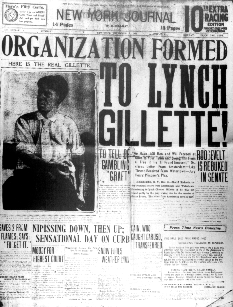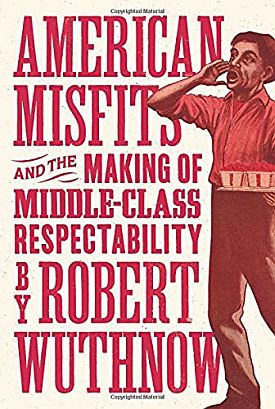The Story the Media Missed
From The New CriterionAlthough I have noticed in myself a decline of interest in sporting competition which seems to have proceeded pari passu with the decline in my ability to take part in it, I got hooked in October on the World Series — nowadays a misnomer, left over from the Barnum-style puffery of baseball’s infancy. But in turning with the renewal of my long-dormant interest to the sports pages of my newspapers, I noticed with a new appreciation that sports writers were only doing in a more concentrated form what all journalists do, all the time. That is they look at the same few events with an eye for extracting from them the best story they can find. They must take a simple binary system — either you win or you lose — and convert any given result into an epic drama of triumph or tragedy. Even in sports where a draw or tie is possible, one team may be seen as being on the way up for not losing and the other on the way down for not winning.
The drama of the baseball playoff series this year was dominated by the fierce and long-standing rivalry between the Red Sox of Boston and the Yankees of New York — which produced a small brawl in the Yankee bullpen at Fenway Park that has since resulted in the filing of criminal charges — and the “curse” that supposedly lay upon the post-season play of both the Red Sox and the Chicago Cubs. The great thing about the curse story was that it was just as big if the curse were fulfilled or if it were broken. In the event, both the Red Sox and the Cubs remained cursed, which meant that the story could continue to run, but the “ghosts” of past Yankee greats who were said to have appeared in time to see off the hapless Bosox failed their Yankee successors in the Series itself.
This was won by the feisty young Marlins of Florida by four games to two, and their victory seemed to have produced even more and better stories than are usually thrown up by this epic autumnal conflict. The competition for the best stories ended in a toss-up between that of the humbling of the proud and “arrogant” Yankees — which produced anger and disappointment for the famously competitive George Steinbrenner, owner of the Yankees — and that of those lovable, happy-go-lucky, improbable Marlins with their even more improbable 72 year-old manager, Jack McKeon, now the oldest manager ever to win a World Series. Of course, both stories were told in virtually every newspaper, but there were plenty of other stories that yielded up their piquancy to the most ingenious or persistent sports journalists.
In a single day’s New York Times after the Marlin victory you could read several columns on the event by writers who were both. George Vecsey chose the contrast between the extreme age (in baseball terms) of McKeon and the extreme youth of the Marlins’ ace pitcher, Josh Beckett. “They are an odd couple of age and youth: Beckett, the swaggering righty from Texas shows little deference to his elders,” he wrote, implicitly recognizing the long American tradition of admiration for sauciness in youth and impatience with tradition. McKeon, for his part, was said to be “too young at heart to hang around his porch” in retirement — another recognized characteristic of the American hero.
This was only one among many appreciations of McKeon’s youthfulness at heart, which was expressed by his playing the bongo drums among other signs of exuberance. “The man likes to have a good time,” wrote Vecsey, ” — music, cigars, cocktails, lots of baseball hypotheses in the sultry and smoky night air.” Meanwhile, for the titillation of the pious, it was said that McKeon was a devout Roman Catholic, a daily communicant who prayed for victory to Saint Thérese of Lisieux. This, however, was not an aspect to the story which proved to be of much interest to the Times. On the page opposite to Vecsey, William C. Rhoden preferred to seek for drama in the juicier and more Yankee-centric question: “Who gets the blame for not winning a World Series?” The Yankees who, he said, were stretched St. Laurence-like on a painful-sounding “franchise-wide griddle,” spend more than three times what the Marlins do on players’ salaries — and, indeed, more than any other team in baseball. This “makes being mowed down by a low-payroll team like the Florida Marlins seem all the more dramatic.”
Indeed it did — almost, you could say, tragic, with the Yankees cast in the role of the overweening tragic hero whose pride incurs the nemesis of the gods. Meanwhile, baseball purists like Dave Anderson of the Times might take the classic, always reliable historical approach of looking back at the previous occasions when the Yankees have lost in Yankee Stadium after returning there down three games to two in the Series — in 1955, 1957, and 1981. Was there a pattern here? The historical method may lack some of the high drama and emotion of the other approaches, but its statistical arabesques have an understated charm all their own. Best of all from the journalist’s point of view, examples and precedents may be chosen at liberty from the history of the past several days, weeks, years or decades. Or all of them together! I particularly enjoyed hearing on All Saints’ Day this year, for example, a radio sports announcer noting of the victory the night before for the Washington Capitals in their ice hockey match against the Atlanta Thrashers that it was “ironic that on Hallowe’en the ‘Caps’ should no longer be haunted by their six-game losing streak.”
That sort of “irony” — like “drama” and “passion” one of the great journalistic desiderata — may be the tiniest bit stretched by the elegant standards of the New York Times, but it is not different in kind from the ironies that even the most exalted political reporters on that paper and elsewhere are always in search of. The power of their political biases to shape a story should not of course be underestimated, but neither should that of their desire to make the story better with ever more striking ironies, particularly if these are ready to hand and familiar enough to the readership that they require no elaborate explanation or justification. As it happened, even as the Marlins were thrashing the Yankees, the big political Story — one which an overwhelming preponderance of the journalistic fraternity could tacitly agree upon and draw their ironies from — was being settled on and was also proving to be a story of hubris and nemesis, of arrogance brought low and humiliated.
Of course it was President Bush who was cast in the role of the New York Yankees. He was supposed to have invaded Iraq “unilaterally,” and without a “plan” for the post-war administration of the country, or an “exit strategy” for American troops. Caught by surprise when resistance continued beyond the end of “major combat operations,” he and his henchmen could only lamely insist on the rightness of their course, urge patience and blame the media for focusing only on the negative side of the American occupation, the continuing drip-drip-drip of American losses which at times — as when a Chinook helicopter was shot down by Iraqi guerrillas, presumably Ba’athist loyalists, with the loss of 16 American dead and 20 wounded at the beginning of November — threatened to become a steady flow. For their part, the media were only too happy to be blamed, if only because the charge was seen as lending some credibility to their by-now routine comparisons of American military efforts with the Vietnam War.
As part of The Story, the idea of a repetition of the tragedy of Vietnam was obviously compelling and full of juicy ironies, which is one reason why the press have shown themselves to be always willing to seize on the slightest excuse to bring the comparison up. Yet in this instance, perhaps because “quagmires” had been mentioned already one or two too many times when no quagmires had ensued, this Story of a doubtless “dramatic” re-run of Vietnam had lately taken a back-seat to attempts to make The Story into a scandal — namely the administration’s alleged “sexing up” of intelligence data about Weapons of Mass Destruction in order to provide a pretext for war. But in spite of several months of effort, the scandal Story hadn’t quite caught on, except among the most ferocious of the President’s critics, who were prepared to believe any evil of him and routinely accused him of bad faith, or even criminal malfeasance.
Meanwhile, continuing attacks on and casualties among American troops in Iraq seemed to make the journalistic ground more hospitable for a return to an old favorite Story, one that had been trotted out every time American armed forces had gone into action since at least Grenada. This Story cast the government in the role not of a criminal gang but of a foolish bunch of amateurs blundering into a morass from which they could not extricate themselves. Oddly, however, it was established mostly by indirection. It was hard to find direct statements of the case for the historical parallel, though there were a few, and easy to find articles, a great many articles, arguing that Iraq was not another Vietnam. And indeed, the comparison of the die-hard Ba’athist suicide bombers in Iraq with a 20-year-old, politically united insurgency enjoying widespread popular support and backed by two superpowers was not just wrong but absurd. Yet the effect of the numerous qualified denials was to reinforce the sense that there were, somewhere, lots of people who were saying that Vietnam was like Iraq.
Often even those who argued for the validity of the comparison rested their case on the most trivial of similarities. David Maraniss, the biographer of Bill Clinton, has a new book to sell — They Marched Into Sunlight: War and Peace, Vietnam and America October 1967 — so it is perhaps not surprising that in conversation with Keith Olbermann on MSNBC he was able to come up with some similarities: “Eerily, in October of 1967, you had a President who was claiming publicly that he was going to prevail and that the press was getting it wrong, which has a lot of similarities with what’s going on today. . .You’re seeing an administration that wants desperately to win the battle of public perceptions. And they were starting to lose it in October of ‘67, they’re starting to lose it again right now as the polls are showing, and so that’s why you see this sort of creative Orwellian language, and you also see manipulation of the facts.”
Manipulation of the facts! It’s shocking isn’t it? At least it is to those, like Mr Maraniss, who are slaves to the transparent journalistic fiction that the facts speak for themselves. Frank Rich of the New York Times found a similarly ingenious way of justifying the comparison to Vietnam by noticing trivial similarities between the White House of George Bush and that of Lyndon Johnson, arguing that “however spurious any analogy between the two wars themselves may be, you can tell that the administration itself now fears that Iraq is becoming a Vietnam by the way it has started to fear TV news.” I wonder if there has ever been an administration, at least since it was established in the wake of Vietnam and Watergate that journalists were to assume an “adversarial” posture towards government, which has not feared TV news? Who doesn’t fear a powerful enemy, armed with the power to hurt or kill with impunity?
Rich led his article with what he obviously regarded as a piece of evidence for his premiss so solid as to need no further explanation. This was Bush’s “now legendary” interview with Brit Hume in which he said he didn’t pay much attention to the media because “the best way to get the news is from objective sources. . . And the most objective sources I have are people on my staff who tell me what’s happening in the world.” Rich’s lumbering attempts at wit at the expense of the President and of Fox News, which broadcast the interview, may be passed over in silence, except to say that his own insulation from reality — or “objectivity” as Bush unfortunately put it — was demonstrated by his assumption in what followed that no sane person could possibly believe the truth and accuracy of reports by government officials to be superior to those of the news media, of which he and his newspaper are such ornaments.
For that assumption is part of The Story too: the Story not only of the War, since all wars are more or less repeats of the Vietnam war when the media came into its own, but the Master Story of the media itself, which since Vietnam have seen themselves as charged with the high and self-appointed task of speaking truth to power. Rich, of course, got his start as a drama critic, but even so he is no more committed to this particular drama of the plucky reporter confronting an arrogant and self-deluded government than most others. But he might at least have the humility to recognize that any politician who relied on the news media for information more than his own staff would be guilty of gross negligence. What does the president employ a staff of expert advisors for if he is only to submit himself to the instruction of Frank Rich and The New York Times? Such a death-wish for his own part would be unfortunate, but on behalf of the people he was elected to serve it would be grounds for impeachment.
Of course it is a truism among journalists of the post-Vietnam, post-Watergate generation that there shall be no limits to the assumption that they must know better how to run the country than the democratically elected leaders and their staffs to whom it is their quasi-constitutional duty to act as correctives — and that this assumption of superior sagacity is founded on nothing but the fact that they occupy regular slots on the editorial, or the op ed pages of major metropolitan newspapers. That’s why no one appears to think it in the least untoward that the likes of Maureen Dowd or Richard Cohen — people who have never in their lives done anything but scribble scribble scribble — should routinely accuse their president and his administration of “incompetence.” If there is a story to be told of arrogance and overweening pride going before a fall, I think I know a better candidate for its hero than George W. Bush.
But it is not only the putative drama of a powerful man afflicted by both arrogance and ignorance stepping into the same quagmire twice which so appeals to the media. It is not even their sheer hostility to Bush, perhaps, so much as it is simple laziness. Vietnam II may or may not be the compelling story they think it is, but it is certainly a familiar story. Its mythic paradigm is subject to as many ingenious reworkings as the outcome of a baseball game, but so intent was the journalistic culture on reworking it that a much better story was being missed — a story potentially more politically damaging than all the nonsense about Vietnam or the absence of allies or of a “plan” or of an “exit strategy.” It is that the administration was taking a colossal risk in betting that for the first time ever an Arab country could be made over into a Western-style democracy by the American example, and by American military might and money.
That, as it happens, was the supposedly missing plan, announced as early as last February in President Bush’s speech to the American Enterprise Institute and repeated with a renewed emphasis to the National Endowment for Democracy in November. The media had forgotten about this plan, or supposed it to be mere boilerplate, in their enthusiasm for the bogus story about a planless administration flailing about helplessly in the midst of a chaos it had had no idea it was getting itself into, and it didn’t take kindly to being reminded of its negligence. The New York Times, for example, showed itself to be the favorite captive of The Story — with which, indeed, it had developed a Stockholm-syndrome of a relationship — when it editorialized that Bush’s astonishing call for “global democratic revolution” was all very well but. . .
Unfortunately, his biggest experiment in democracy promotion has been in Iraq, and he has not been going about it in the most promising ways. As Iraqis are showing, even a terrorized population does not much enjoy foreign invasion and occupation. Nor does it help that Washington is running the show itself, keeping the United Nations and Iraqis mainly on the sidelines. . .To succeed in this vitally important endeavor, the Bush administration will have to learn to put the same kind of energy and resources into the diplomatic and educational sides of foreign policy as it has devoted to unilateral military action.
Seldom in the history of editorial-writing can a more revolutionary policy initiative have been met by a more crashing banality.
The Story of the administration’s incompetence had blinded the Times, together with most of the rest of the media, to the real story of its shocking audacity. Bush’s plan was breathtakingly bold, and there was every reason to expect that it would fail. This was the rock on which the administrations not of Lyndon Johnson and Richard Nixon only but of Woodrow Wilson and Jimmy Carter too had foundered, and Bush — whose party had opposed both of them and who had campaigned against a “nation-building” foreign policy in 2000 — was preparing to go much further than either of those presidents had gone. Not surprisingly, he had looked rather to the example of Ronald Reagan in the Cold War, but no part of Reagan’s engagement with Soviet Communism had depended on the transformation of tribal despotisms and third-world oligarchies into Western style democracies.
Was not this hubris? Was not this arrogance? Did it not invite the most terrible nemesis? How trivial in comparison seemed the alleged “arrogance” of the alleged “go-it-alone” — which was actually a go-it-with-only-a-few-dozen-allies — philosophy on which the media harped incessantly. Those who opposed Bush should have been rubbing their hands with glee, or else arguing that the nobility of the attempt was the only thing going for it, while those who supported him might have tried to make the case that, unlikely as success always was, making the attempt was nevertheless the safest option, since any other would have been equally futile and this one at least had the twin merits of demonstrating our good faith to moderate Arabs and concentrating the murderous energies of the terrorists on our troops overseas rather than on our civilians at home.
But for better or for worse, Bush’s call to revolutionary action was quite simply The Story not only of his administration but of America’s role in the world in the early 21st century — and yet the media missed it because it was splashing around in the Vietnam “quagmire.” The sports reporters would have done a better job.
Discover more from James Bowman
Subscribe to get the latest posts to your email.







